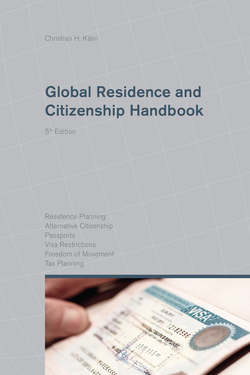Читать книгу Global Residence and Citizenship Handbook - Christian H. Kälin - Страница 47
На сайте Литреса книга снята с продажи.
2.1Why become a citizen of more than one country
ОглавлениеDue to political or economic circumstances, citizens of many countries find it difficult to travel abroad and are confronted with strict visa requirements each time they want to enter a foreign country.23
Furthermore, nationals whose passports usually allow them easy access to most countries can find it impossible to obtain visas due to temporary travel restrictions during trade sanctions and other geopolitical disturbances; or due to their nationality may be overly exposed to terrorist threats and other hostility.24
Moreover, even though the necessary visa may be granted to you, getting a visa is always a very tiresome procedure. During this time, the passport on which you are getting the visa is not available – and this can be a significant factor of delay for your travels. 18% of Chinese visitors to Europe, for instance, make it to the UK, but two-thirds visit France, a member of the Schengen travel zone where visas are easier to get.25
Visa-free travel can also be obtained via a residence permit, not only through a second passport. For example, residence in any of the Schengen countries will offer visa-free travel throughout the Schengen area of Europe. However, only the acquisition of a second citizenship and a second passport can guarantee the desired long-term visa-free travel, and only citizenship guarantees the long-term security of these privileges.26
If you cannot acquire or renew your passport in your home country, for example due to political instability, civil war, revolution or change of government, having another passport can be very useful, even critical. Even if you simply lose your passport, it may take some time until you can get a replacement.
There is a growing tendency in many countries to follow the US in taxing even non-resident citizens.27 In fact, I believe that this will be an increasingly important issue in the future. As individual states are struggling to keep their tax base, both corporate and individual taxation systems will have to undergo substantial changes. For income taxation and other taxes on individuals, citizenship may become an increasingly important, if not decisive, factor. I anticipate that some countries will introduce similar legislation to that which the US currently has and will tax its citizens regardless of their place of residence. At the very least I can imagine that this would apply, for example, to all EU citizens resident within the EU. Therefore, having alternative citizenship options will become even more important for wealthy individuals who may want to plan around such new taxation rules. Being a citizen of more than one country, and ideally in more than one continent, will be the norm for the global entrepreneur and investor in the future.
Meanwhile, citizenship also plays a role in some countries to determine whether you may still be deemed tax resident or domiciled (including Germany, Sweden, the UK and others), and citizenship is one of the tie-breaker rules in most double tax treaties. Alternative citizenship is therefore becoming increasingly important as an effective tool for international tax planning.
If you wish to have the possibility to retire in a safe haven in the future you can only fully secure this option if you acquire either permanent residence or citizenship of that country. However, even a ‘permanent’ residence permit does not mean full security, as it may still be subject to renewal, revocation, or new conditions. Becoming a citizen is the only way to secure a life-long status and guarantees a secure and truly permanent alternative place to go to. This is also what the Hong Kong elite was aware of on the eve of the return of the colony from British to Chinese rule, as about 600,000 of Hong Kongers – about 10% of the population – held second passports as an insurance against mainland-Chinese rule. More than half the members of the transition preparatory committee carried foreign passports.28
Generally, as a citizen of two or more different states, you are in a privileged position compared to having just one citizenship, you have more planning options and more personal freedom. If you want to acquire real estate of a certain size in Italy for example, you can only do so if the country of your citizenship in return allows Italian citizens to buy property without restrictions. If that is not the case, you cannot buy in Italy, unless, of course, you are also a citizen of another country which may not have such restrictions in place.
Most importantly, citizenship and a passport, particularly from a small, peaceful country, can save your life when travelling in times of political unrest, civil war, terrorism, and other difficult situations. Many international businesspeople and important people who are active worldwide actually consider an alternative passport to be the best life insurance money can buy.
In an unsettled, ever-changing world, acquiring a second citizenship is a wise decision and an investment for the future. When you acquire citizenship, your spouse and children, and sometimes parents,29 may be included. Citizenship is for life and can be passed on to future generations.30 Depending on the other country or countries of which you are a citizen, there is often no need to give up your present citizenship while you enjoy the benefits of a second citizenship and passport, as states increasingly allow multiple nationalities.31
